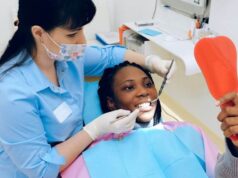Many Nigerians hold on tenaciously to certain dental myths, which they believe affect their oral health in one way or the other. Dentists have continued to enlighten the people that these beliefs they have about their oral health are both untrue and unrealistic. However most of the people, especially those in the rural areas are still adamant towards oral health campaigns that speak against these wrong dental notions.
What is a myth?
According to the Merriam – Webster Dictionary, myth means:
(a) a popular belief or tradition that has grown up around something or someone especially : one embodying the ideals and institutions of a society or segment of society.
(b) an unfounded or false notion.
The practice of dentistry in Nigeria is not without one or two false notions. There are several dental myths that a lot of Nigerians have believed that tend to scare them away from booking appointments with dentists.
These false, but strongly adhered to notions and ideas have affected the manner in which the average Nigerian views dental practice and dental treatments in the country. Many of them believe that if they receive certain dental treatments, something bad would happen to their oral health.
Some of the common dental misconceptions include the following:
1. A worm in the Tooth Causes Toothache
One of the common dental myths is the claim by some Nigerians that a worm is responsible for toothache. They claim when they rinse their mouth with certain local herbal liquid and spit out the content into a container, they see a live worm, which they believe is responsible for their toothache.
Though this claim is superstitious, it has been very difficult to convince those that hold such beliefs otherwise.
It is important to note that the commonest cause of toothache is tooth decay.
This myth, which is a reality in many other African countries, is false, because dentists have explained that tooth decay occurs when certain bacteria in the mouth interact sufficiently with sugar substrate in the presence of a tooth at risk.
There is no scientific evidence that supports the existence of worms within the tooth that can cause dental cavities or toothache as many Nigerians have believed.
2. Dental Powder Cures Toothache and Dental Abscesses
I consider this particular notion as one of the most misleading dental myths among Nigerians. Makers and vendors of local dental powder popularly known as Agnes Nwanma have succeeded in convincing the average Nigerian that their product is the solution to toothache. They also claim that this local teeth powder can cure dental abscesses.
These local products are widely patronised by the Nigerian population because they are very cheap.
Contrary to the popular Nigerian belief, dentists have warned that local dental powder in any form is not a medication for toothache and as such does not relieve dental pain. Even when used as a tooth cleaning agent, it can do more harm than good. For example, dental powder contains more abrasives than the quantity recommended in toothpaste. Therefore, when used as a dentifrice, it can cause a number of dental problems like wearing down of the gums (gum recession), gum bleeding and wearing away of the tooth substance (tooth wear lesions).
The local powder also does not contain the correct amount of fluoride required in toothpaste for both adults and children. This could make the teeth prone to dental cavities as the protection offered by the acclaimed fluoride is either inadequate or completely missing.
3. No Need to See a Dentist if the tooth does not hurt
This is one of those dental myths practised by some Nigerians that has led to serious dental complications that otherwise are largely preventable. Many Nigerians believe that the only time to see a dentist is when there is toothache. Dentists have also observed that the majority of the people visit the dental clinic when they experience toothache, including some of those who are aware that they could get a dental filling if they had come earlier.
It seems toothache is the only thing an average Nigerian considers as a dental problem. In fact, some people will not go to the dental clinic even when they experience toothache. Instead, they prefer to go to the pharmacy to buy analgesics for the pain. This group of people only go to see a dentist when the pain becomes very excruciating or when they have other complications like jaw swelling and difficulty in mouth opening.
4. Once You Extract a Tooth, You Will End Up Extracting Other Teeth
This is one of the dental myths that have been used to brainwash many Nigerians including some of the educated ones. Many people in our environment believe that one tooth extraction will lead to the subsequent extraction of several other teeth. This singular myth has instilled fear of the unknown into several people and causing them to either delay or avoid visiting a dentist.
When dental visits are delayed, it gives room for the problem to grow worse with attendant complications. Many don’t know that dental treatments tend to become more expensive the moment complications begin to arise. When it comes to dental treatments, the rule is the earlier the better.
Tooth extraction does not lead to the extraction of other teeth. A lot of Nigerians present late to the dental clinic. This gives room for more damages to occur in the teeth.
This popular Nigerian belief is false as dentists will only remove a bad tooth when it cannot be restored or the patient cannot afford the cost of other forms of treatment such as root canal therapy.
5. All Dentists Do Is Tooth Extraction
An average Nigerian believes that the only thing a dentist does is tooth extraction. They are either not aware or care less about other forms of dental treatment. Since they don’t want their teeth extracted, the last thing they want to do is to visit a dental clinic.
This is one of those dental myths that is common among Nigerians who usually present late to the dental clinic with very bad tooth/teeth such as retained roots and leaving the dentist with no option but to remove the offending tooth/teeth. If tooth decay becomes extensive, the tooth may no longer be restorable. In that case, a dentist would have to extract it to prevent further complications that might occur.
According to a study published by the National Health Institute in 2020, dental caries (tooth decay) and periodontal disease (gum disease) were identified as the main causes for extraction. The above two are rank among the prevalent dental problems in our environment.
6. Teeth Cleaning Is the Same Thing as Teeth Whitening
I added this misconception as one of the common dental myths because a lot of Nigerians don’t know the difference between professional teeth cleaning and teeth bleaching. They believe the two dental procedures mean the same thing and so they use them interchangeably.
Professional teeth cleaning is what dentists refer to as scaling and polishing. It involves the removal of dental plaque, calculus, and stains from the teeth surfaces. Teeth whitening on the other hand is a cosmetic procedure that involves the bleaching of the enamel. Scaling and polishing is a preventive procedure. It helps to keep the gums and other periodontal structures healthy. Teeth whitening, is done for purely aesthetic reasons.
It is advisable you visit your dentist at least twice a year for routine check and professional teeth cleaning.
7. Painkillers Cure Toothache
This is one of those dental myths that encourage the abuse of analgesics among Nigerians with dental problems. The average Nigerian would rather go to the pharmacy to buy drugs than see a dentist. They believe that pain killers cure toothache. Whereas analgesics can be helpful during toothache, they only offer a temporary relief. Pain here is only a symptom and not the disease. The individual will continue to experience pain once the effect of the analgesic wears off. A dentist should identify and treat the cause of the dental pain.
Indiscriminate use of painkillers can pose a danger to your general health. For instance, abuse of NSAIDS can precipitate peptic ulcer disease.
It is not advisable to resort to self care when you have a dental problem. It is appropriate to see a dentist the moment you notice any problem in your oral cavity and teeth. He or she will carry out necessary examinations to identify and treat the problem.
Conclusion
Your oral health is an important aspect of your general health. Therefore, do not neglect it for any reason. Do not allow any unverified notion or belief hinder you from accessing proper dental care.
The Nigerian Dental Association are playing a huge role in demystifying these common myths through their various oral health enlightenment campaigns. They encourage the people not to allow any unverified notions to hinder them from seeing a dentist.
Remember to always visit your dentists at least twice a year. Avoid the use of products not recommended by your dentist.









